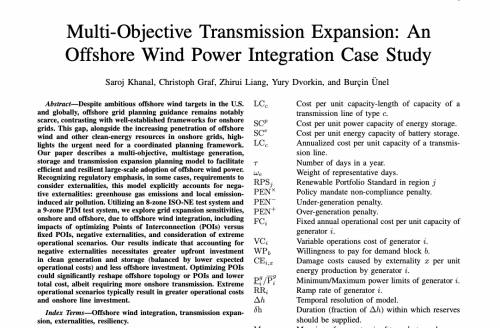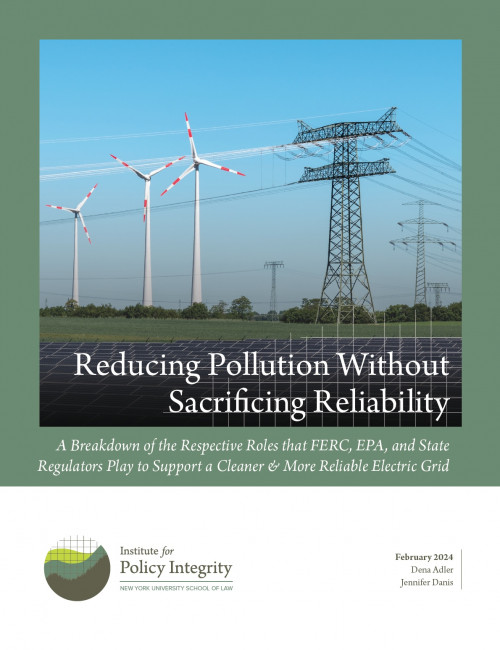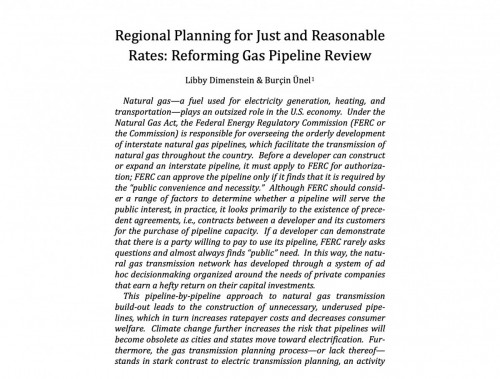-
Comments to PJM on Predicting Policy-Driven Retirements for Order No. 1920 Scenario Development
PJM Interconnection, which operates and plans the transmission grid in the mid-Atlantic region, has begun a stakeholder process on its implementation of the Federal Energy Regulatory Commission's Order No. 1920, including scenario development. Under Order No. 1920, one mandatory input into this process is policy-driven retirements of generation resources. PJM requested feedback on how it should forecast policy-driven retirements. Policy Integrity's comments explained that PJM should not rely exclusively on generation owners' self-reports of their intentions to retire or continue operating their units, because generation owners face incentives to make strategic but erroneous reports to benefit other generation assets in their portfolios. Instead, Policy Integrity recommended a specific three-step approach.
-
Comments to the Public Utility Commission of Texas on System Reliability Standard
After Winter Storm Uri, the Texas Legislature tasked the Public Utility Commission of Texas with revisiting its standard for system reliability. The Commission responded by proposing a multi-metric reliability standard—one that defines "reliability" not just in terms of the frequency of outages, but also the maximum tolerable duration and magnitude of these events. In our comments, Policy Integrity supported the Commission's overall approach, because multi-metric reliability criteria are an emerging best practice compared to the old one-in-ten approach. We also suggested other ways the Commission could strengthen its proposal.
-

Cost-Effective Capacity Markets
In this paper, available on SSRN, we develop a model of a wholesale electricity market with energy and capacity market components to examine the economic relationship between costs and reliability. We investigate the importance of efficient resource accreditation—the amount by which to compensate resources for their contribution to system reliability. We show that "marginal effective load carrying capability," an accreditation method increasingly adopted by system operators, is theoretically optimal.
-
Policy Integrity Comments Reflected in FERC’s Order 1977 on Backstop Siting Authority for Transmission Facilities
On May 13, 2024, FERC issued Order 1977 to implement its authority to site transmission facilities that have been rejected (or not acted upon) by states. In our comments, we asked FERC to clarify that the proposed requirement that applicants estimate reasonably foreseeable emissions for their proposed transmission facilities includes the projects' impacts on power-system emissions. In response, the Commission clarified that these power-sector emissions must be estimated where they are reasonably foreseeable. And, consistent with our comments' legal analysis, FERC confirmed its authority to require applicants to submit these and other air quality impacts under the Federal Power Act's backstop siting provision. FERC also agreed with our and others’ analysis that it has the statutory authority under the Federal Power Act and to also consider environmental justice impacts when exercising backstop siting authority. -
Policy Integrity Comments Reflected in FERC’s Order 1920 on Transmission Planning and Cost Allocation
On May 13, 2024, FERC issued Order 1920, a landmark rule to improve regional transmission planning and cost allocation processes. The Order could ease the process of expanding electric transmission, helping integrate much more renewable energy to the U.S. grid. We submitted four rounds of comments in this proceeding: at the advanced notice of proposed rulemaking stage, then on the proposal, and then two sets of supplemental comments. For several key features of the final rule, FERC adopted our recommendations.
-
Policy Integrity Scholarship Cited in Letter from Four New England Senators to ISO-NE
On April 30, 2024, Senators Markey, Sanders, Warren, and Whitehouse sent a letter to ISO-NE President and CEO Gordon van Welie urging the independent system operator to improve its governance policies, proactively plan for new transmission, and ensure fair access to markets for clean energy technologies. The letter advocated for several changes that Policy Integrity has pushed in the past, including increasing opportunities for community participation in energy policy decisions and pursuing longer-term, holistic transmission planning. On the latter point, the letter cited our December 2023 report that advocated for more proactive transmission planning on the part of energy decisionmakers.
-
Policy Integrity Recommendations Reflected in DOE’s Transmission Permitting Rule
On April 25, 2024, the Department of Energy (DOE) released its final rule under 16 U.S.C. § 824p(h) to expedite the federal authorization of transmission projects. We commented in support of the proposal, including DOE's proposed requirement that project proponents describe how the transmission project would affect power-system greenhouse gas (GHG) emissions. In the final rule, DOE retained the requirement to describe power-system GHG impacts and, in response to our recommendation, clarified that the ambiguous language in the proposal does require project proponents to estimate non-power-system GHG emissions and power-system emissions of local air pollutants.
-

Multi-Objective Transmission Expansion
An Offshore Wind Power Integration Case Study
Our paper describes a multi-objective, multistage generation, storage and transmission expansion planning model to facilitate efficient and resilient large-scale adoption of offshore wind power. Recognizing regulatory emphasis and, in some cases, requirements to consider externalities, this model explicitly accounts for negative externalities: greenhouse gas emissions and local emission-induced air pollution. Our results indicate that accounting for negative externalities necessitates greater upfront investment in clean generation and storage (balanced by lower expected operational costs). Optimizing POIs could significantly reshape offshore topology or POIs, and lower total cost. Finally, accounting for extreme operational scenarios typically results in greater operational costs and sometimes may alter onshore line investment.
-

Reducing Pollution Without Sacrificing Reliability
A Breakdown of the Respective Roles that FERC, EPA, and State Regulators Play to Support a Cleaner & More Reliable Electric Grid
Multiple federal and state regulators must coordinate their efforts to ensure electric grid reliability, particularly during a period of major transition, and it is important to understand what role each of them plays. This report reviews the respective roles of FERC, RTOs/ISOs, other transmission operators, state public utility commissions, and state environmental regulators. EPA’s duty to reduce GHG emissions that endanger public health and FERC’s duty to steward grid reliability will require them to coordinate each other’s respective expertise as they work with RTOs/ISOs, state regulators, and utilities to implement EPA rules.
-

Regional Planning for Just and Reasonable Rates: Reforming Gas Pipeline Review
Published in the Columbia Journal of Environmental Law
Natural gas plays an outsized role in the U.S. economy. Under the Natural Gas Act, the Federal Energy Regulatory Commission (FERC or the Commission) is responsible for overseeing the orderly development of interstate natural gas pipelines, which facilitate the transmission of natural gas throughout the country. FERC can approve the pipeline only if it finds that it is required by the “public convenience and necessity.” Although FERC should consider a range of factors to determine whether a pipeline will serve the public interest, in practice, it looks primarily to the contracts between a developer and its customers for the purchase of pipeline capacity. If a developer can demonstrate that there is a party willing to pay to use its pipeline, FERC rarely asks questions and almost always finds “public” need. This pipeline-by-pipeline approach to natural gas transmission build-out leads to the construction of unnecessary, underused pipelines, which in turn increases ratepayer costs and decreases consumer welfare. Climate change further increases the risk that pipelines will become obsolete as cities and states move toward electrification. Relying on economic theory, legal history, and policy analysis, we make the case in this paper—pulished in the Columbia Journal of Environmental Law— for FERC’s adoption of regional gas transmission planning.
Viewing recent projects in Electricity






